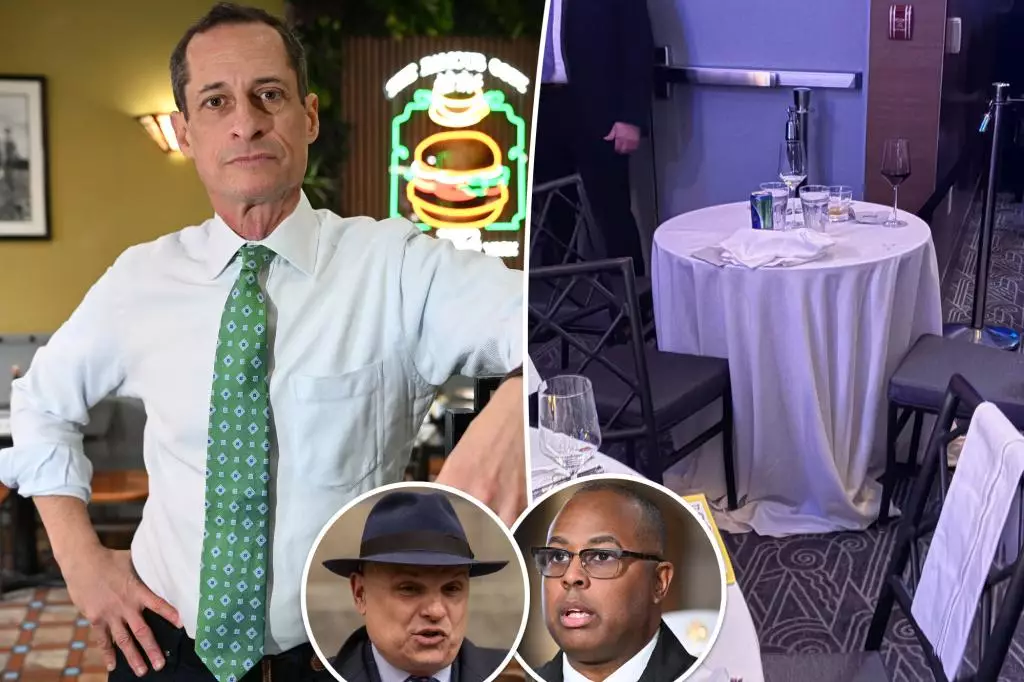In the grand theater of New York politics, where power, status, and reputation intertwine, the seating arrangements at events like the Inner Circle dinner become a microcosm of the larger political landscape. The recent gala, which was more than just a charity event, showcased the complexities of social hierarchies within the political elite. Attendees gathered at the lavish Ziegfeld Ballroom for an evening filled with humor and camaraderie, but one name that emerged from the event was disgraced congressman Anthony Weiner, whose placement at a so-called “kid’s table” stirred whispers and laughter among the attendees.
While the Inner Circle dinner is typically a platform for lighthearted jabs at the city’s political figures, Weiner’s seating mishap drew attention away from the comedic performances, instead shining a spotlight on the often unspoken rules of political engagements. Here was a man who, despite his previous high-ranking political status, found himself humorously relegated to a lesser position, teasingly dubbed the “small Weiner table.” This situation not only hints at Weiner’s current standing within New York politics but also raises questions about how past misconduct influences current perceptions and relationships within this tightly-knit circle.
Perception vs. Reality: Weiner’s Return to the Political Scene
As Weiner aims for a political comeback, his quest is often viewed through the lens of skepticism, both from the public and fellow politicians. While he maintains that the placement was mere happenstance, the fact that he departed early, purportedly to attend to his son, might also signal the weight of the embarrassment he faced in that social hierarchy. The world of politics is relentless, and the stakes are high. The ritual of dining among political giants is as much about maintaining appearances as it is about forging alliances or connections.
Weiner’s history adds layers of intrigue to his narrative. With a storied past marked by scandal—his rise and fall encapsulated in a contentious digital age narrative—one must ask whether people can truly separate the man from his misdeeds. Arthur Aidala, Weiner’s attorney and friend, stepped forward to clarify the seating issues. His defense of Weiner suggests a loyalty deeply entrenched in their long-standing relationship. However, Aidala’s explanations also underscore a broader theme: the fragility of reputation and how easily perceptions can shift—especially in the cutthroat realm of political power dynamics.
The Role of Friendship Among the Elite
Within these elite spheres, friendships are often founded on shared experiences and mutual dependence. Aidala’s comment about their decades-long friendship reflects a significant social dimension—it reveals how personal allegiances might sometimes outweigh professional boundaries. Aidala’s long-standing attendance at the Inner Circle events—dating back to the days when his grandfather wrote for a major newspaper—illustrates a deep-rooted connection to New York’s political theater, reminiscent of old-world family ties where names carried weight and influence.
Weiner’s re-emergence in the political arena is an interesting juxtaposition against the backdrop of his former wife, Huma Abedin, who is charting her path with billionaire Alex Soros. The intertwining of personal stories, such as Weiner’s past relationship with Abedin, hints at emotional undercurrents that exist below the surface of political maneuvering. This narrative begs the question: how do personal histories and public images coalesce in a town where reputations are often reconstructed in the blink of an eye?
The Intricacies of Celebrity and Political Satire
Amidst this backdrop, the Inner Circle dinner remains a space where the theatrics of comedy do battle with the gravity of political reality. This year’s roast tackled prominent figures, including Mayor Eric Adams and Andrew Cuomo, acknowledging the financial and bureaucratic pressures faced within city governance. Yet, the humorous jabs also served to reinforce the social hierarchies present within the room. As laughter erupted, so too did a sense of unity among the political class, though moments like Weiner’s mishap serve as a reminder of the thin ice many walk on.
Ultimately, moments that could easily be construed as humiliating—like being seated at the “kid’s table”—reflect broader societal attitudes and systemic inequities present in political circles. Events such as the Inner Circle dinner embody the complex interplay of humor, power, and perception, revealing that within these walls, a mere slip in seating can echo much louder than a punchline. The reputation of any individual, particularly those as controversial as Weiner, remains perpetually fragile, constantly shaped by public sentiment and the intricate ballet of political friendships and rivalries.

